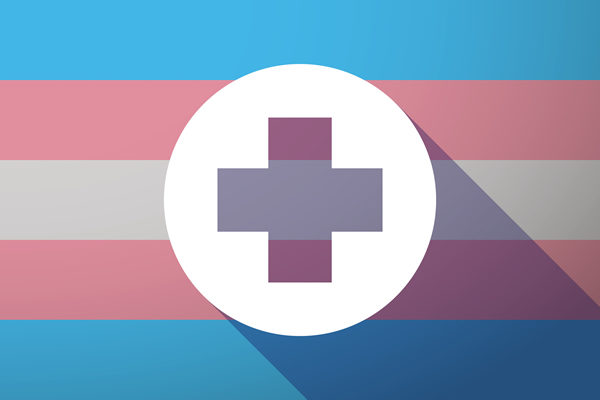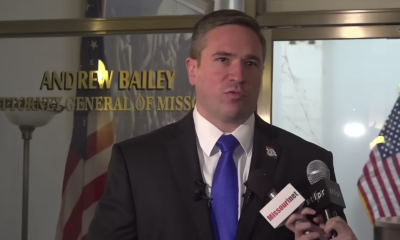National
9th Circuit: Gender reassignment surgery must be granted to trans inmates
Court rules denying procedure violates 8th Amendment


Denying gender reassignment surgery to transgender prison inmates is prohibited under the U.S. Constitution, a federal appeals court ruled Friday.
A three-judge panel on the U.S. Ninth Circuit Court of Appeals issued the per curiam decision on the basis that gender reassignment surgery is medically necessary, so denying the procedure to prison inmates violates the Eighth Amendment.
“We hold that where, as here, the record shows that the medically necessary treatment for a prisoner’s gender dysphoria is gender confirmation surgery, and responsible prison officials deny such treatment with full awareness of the prisoner’s suffering, those officials violate the Eighth Amendment’s prohibition on cruel and unusual punishment,” the decision says.
The three-judge panel that issued the ruling consists of U.S. Circuit Judge Mary Margaret McKeown, a Clinton appointee; U.S. Circuit Judge Ronald Gould, another Clinton appointee; and U.S. District Judge Robert Lasnik, another Clinton appointee sitting by designation on the Ninth Circuit.
The ruling affirms taxpayer funds will be used to provide gender reassignment surgery to Adree Edmo, who’s transgender and has been an inmate in the Idaho State Correctional Institution since 2012. Edmo has been ever since she pleaded guilty to sexual abuse of a 15-year-old male at a house party.
Edmo doesn’t have access to her personal funds while she’s incarcerated. The estimated cost of male-to-female gender reassignment surgery can be more than $100,000.
Medical providers have documented Edmo’s feminine presentation since 2012 and she has testified she “continues to actively think about self-castration” in prison, according to the Ninth Circuit decision.
“I am relieved and grateful the court recognized my right to necessary medical treatment, and that I will get the surgery I need,” Edmo said in a statement. “I hope my case helps the State of Idaho understand that they can’t deny medical care to transgender people.”
The case came to the Ninth Circuit upon appeal after U.S. Chief District Judge B. Lynn Winmil in Idaho issued a decision ordering the state to grant gender reassignment surgery to Edmo, who sued the state in 2017 after the Idaho Department of Corrections refused to great her the procedure.
“Although we addressed this appeal on an expedited basis, it has been more than a year since doctors concluded that GCS is medically necessary for Edmo,” the Ninth Circuit decision says. “We urge the state to move forward. We emphatically do not speak to other cases, but the facts of this case call for expeditious effectuation of the injunction.”
The Ninth Circuit affirmed Winmill’s order with respect to granting gender reassignment surgery to Edmo, but remanded to the trial court a separate with respect to whether Corizon, Inc., a private for-profit corporation that provides health care to inmates in Idaho prisons, should be included in the injunction.
The Ninth Circuit is now the only federal appeals court with a standing ruling ordering gender reassignment surgery. Although a three-judge panel on the U.S. First Circuit Court of Appeals ordered the procedure in 2014, the full court later reversed that decision.
Representing Edmo in the case was the National Center for Lesbian Rights, which noted the significance of the decision after it was handed down.
“One of the foundational principles of our Constitution is that the State cannot subject people in its custody to cruel and unusual punishment, including by failing to treat serious medical conditions,” NCLR Senior Staff Attorney Amy Whelan said in a statement. “This ruling is in line not only with long-standing medical evidence, but also with legal rulings across the country that it is dangerous and unconstitutional to deny transgender people access to medically necessary care in prison.”
The Washington Blade has placed a request in with the Boise-based law firm Moore Elia Kraft & Hall, LLP, which is representing the Idaho Department of Corrections, to seek comment on whether the state will seek an “en banc” rehearing before the Ninth Circuit or take up the matter before the U.S. Supreme Court.
The issue of whether transgender inmates are entitled to gender reassignment surgery has been percolating for some time and has dogged Democratic presidential candidate Kamala Harris, who as attorney general represented the California Department of Corrections in seeking to deny the procedure to two inmates.
As media scrutiny of the cases grew, Harris helped the California Department of Corrections reach an agreement in which to set up a process where transgender inmates could obtain transition-related care, including gender reassignment surgery. Both of the transgender inmates in those cases were able to obtain gender reassignment surgery, one through the state health care system after obtaining parole.
It should be noted Harris didn’t seek to the agreement to grant transgender inmates gender reassignment surgery until after a court already ordered one the transgender inmates be granted the procedure. At least one transgender advocate in California has also said the California Department of Correction has built a reputation for not fulfilling the agreement reached on behalf of transgender inmates.
Harris, in a statement provided to the Washington Blade from her presidential campaign, said she supports the Ninth Circuit decision in the Edmo case.
“This ruling rightly reaffirms the right to adequate and comprehensive health care, including transition-related care for those at correctional facilities,” Harris said. “Everyone deserves access to compassionate and comprehensive care.”
New York
Pride flag raised at Stonewall after National Park Service took it down
‘Our flag represents dignity and human rights’

A Pride flag was raised at the site of the Stonewall National Monument days after a National Park Service directive banned flying the flag at the birthplace of the LGBTQ rights movement in the U.S.
The flag-raising was led by Manhattan Borough President Brad Hoylman-Sigal and supported by other elected officials.
“The community should rejoice. We have prevailed,” Hoylman-Sigal said shortly after the flag was hoisted. “Our flag represents dignity and human rights.”
The flag now sits in Christopher Street Park, feet away from the Stonewall Inn, where in 1969 a police raid of the gay bar sparked outrage and led to a rising of LGBTQ people pushing back on NYPD brutality and unjust treatment.
Elected officials brought a new flagpole with them, using plastic zip ties to attach it to the existing pole.
In 2016, President Barack Obama declared the site a national monument.
One day before the planned re-raising of the Pride flag, the National Park Service installed only an American flag on the flagpole, which days prior had flown a rainbow flag bearing the NPS logo.
The directive removing the flag was put forward by Trump-appointed National Park Service Acting Director Jessica Bowron.
This comes one day after more than 20 LGBTQ organizations from across the country co-signed a letter to Interior Secretary Doug Burgum and General Services Administrator Ed Forst, demanding the flag be restored to the monument.
“It is our understanding that the policy provides limited exceptions for non-agency flags that provide historical context or play a role in historic reenactments. Simply put, we urge you to grant this flag an exception and raise it once again, immediately,” the letter read. “It also serves as an important reminder to the 30+ million LGBTQ+ Americans, who continue to face disproportionate threats to our lives and our liberty, that the sites and symbols that tell our stories are worth honoring … However, given recent removals of the site’s references to transgender and bisexual people — people who irrefutably played a pivotal role in this history — it is clear that this is not about the preservation of the historical record.”
The letter finished with a message of resilience the LGBTQ community is known for: “The history and the legacy of Stonewall must live on. Our community cannot simply be erased with the removal of a flag. We will continue to stand up and fight to ensure that LGBTQ+ history should not only be protected — it should be celebrated as a milestone in American resilience and progress.”
When asked about the directive, the NPS responded with this statement:
“Current Department of the Interior policy provides that the National Park Service may only fly the U.S. flag, Department of the Interior flags, and the Prisoner of War/Missing in Action flag on flagpoles and public display points. The policy allows limited exceptions, permitting non-agency flags when they serve an official purpose. These include historical context or reenactments, current military branch flags, flags of federally recognized tribal nations affiliated with a park, flags at sites co-managed with other federal, state, or municipal partners, flags required for international park designations, and flags displayed under agreements with U.S. Citizenship and Immigration Services for Naturalization ceremonies.”
An Interior Department spokesperson on Thursday called the move to return the flag to the monument a “political stunt.”
“Today’s political pageantry shows how utterly incompetent and misaligned the New York City officials are with the problems their city is facing,” a department spokesperson said when reached for comment.
The clash comes amid broader efforts by the Trump-Vance administration to minimize LGBTQ history and political power. The White House has spent much of President Donald Trump’s second presidency restricting transgender rights — stopping gender-affirming care for transgender youth, issuing an executive order stating the federal government will recognize only two sexes, male and female, and blocking Medicaid and Medicare from being used for gender-affirming care.
State Department
FOIA lawsuit filed against State Department for PEPFAR records
Council for Global Equality, Physicians for Human Rights seeking data, documents

The Council for Global Equality and Physicians for Human Rights have filed a Freedom of Information Act lawsuit against the State Department for PEPFAR-related data and documents.
The groups, which Democracy Forward represents, filed the lawsuit in U.S. District Court for the Southern District of New York on Wednesday.
Then-President George W. Bush in 2003 signed legislation that created PEPFAR. UNAIDS Executive Director Winnie Byanyima last March said PEPFAR has saved 26 million lives around the world.
The Trump-Vance administration in January 2025 froze nearly all U.S. foreign aid spending for at least 90 days. Secretary of State Marco Rubio later issued a waiver that allowed PEPFAR and other “life-saving humanitarian assistance” programs to continue to operate during the freeze.
The Washington Blade has previously reported PEPFAR-funded programs in Kenya and other African countries have been forced to suspend services and even shut down because of gaps in U.S. funding. HIV/AIDS activists have also sharply criticized the Trump-Vance administration over reported plans it will not fully fund PEPFAR in the current fiscal year.
The lawsuit notes the Council for Global Equality and Physicians for Human Rights have “filed several FOIA requests” with the State Department for PEPFAR-related data and documents. The groups filed their most recent request on Jan. 30.
“On Jan. 30, 2026, plaintiffs, through counsel, sent State a letter asking it to commit to prompt production of the requested records,” reads the lawsuit. “State responded that the request was being processed but did not commit to any timeline for production.”
“Plaintiffs have received no subsequent communication from State regarding this FOIA request,” it notes.
“Transparency and inclusion have been hallmarks of PEPFAR’s success in the last decade,” said Beirne Roose-Snyder, a senior policy fellow at the Council for Global Equality, in a press release that announced the lawsuit. “This unprecedented withholding of data, and concurrent ideological misdirection of foreign assistance to exclude LGBTQI+ people and others who need inclusive programming, has potentially devastating and asymmetrical impacts on already marginalized communities.”
“This data is vital to understanding who’s getting access to care and who’s being left behind,” added Roose-Snyder.
“We filed this lawsuit to seek transparency: the administration’s PEPFAR data blackout withholds information the public, health providers, and affected communities need to track the HIV epidemic and prevent avoidable illness and death, obscuring the true human cost of these policy decisions,” said Physicians for Human Rights Research, Legal, and Advocacy Director Payal Shah.
The State Department has yet to respond to the Blade’s request for comment on the lawsuit.
New York
N.Y. lawmaker vows ‘Pride flag will fly again’ at Stonewall Monument
After a Jan. 21 policy shift, Pride flags were banned at national parks, prompting backlash from Bottcher and LGBTQ advocates.

Hours after news broke that the National Park Service would no longer allow Pride flags to fly at the Stonewall National Monument — the birthplace of the modern LGBTQ rights movement in the United States — the Washington Blade spoke with New York State Sen. Erik Bottcher, who represents the area surrounding the Stonewall Inn and the national monument.
During the interview, Bottcher, who is gay, spoke about the policy change and outlined steps he plans to take in the coming days to push for its reversal.
“This is another act of erasure,” Bottcher told the Blade. “It’s a cowardly attempt to rewrite history and to intimidate our community. This is Stonewall — it’s where we fought back, where we ignited a global movement for equality — and we refuse to go back. We’re not going to accept these acts of erasure.”
The Stonewall Inn became a flashpoint in 1969 after NYPD officers raided the bar, part of a longstanding pattern of police harassment of LGBTQ spaces. The raid sparked days of protest and resistance along Christopher Street, now widely recognized as the catalyst for the modern LGBTQ rights movement.
While the events are often referred to as the “Stonewall Riots,” many activists and historians prefer the term “Stonewall Uprising,” emphasizing that the resistance was a response to systemic oppression rather than senseless violence. LGBTQ patrons and community members fought back — shouting “Gay Power!” and “Liberate Christopher Street!” — as crowds grew and frustration with police abuse boiled over.
Since the uprising, LGBTQ people and allies have gathered annually in June to commemorate Stonewall and to celebrate Pride, honoring the movement that placed LGBTQ voices at the center of the fight for equality.
In June 2016, then President Barack Obama officially designated the space as the Stonewall National Monument, making it the United States’s first national monument designated for an LGBTQ historic site.
Now, nearly 10 years later, President Trump’s appointed NPS acting director Jessica Bowron changed policy on Jan. 21 regarding which flags are allowed to be flown in national parks. Many, including Bottcher, say this is part of a larger targeted and deliberate attempt by the administration to erase LGBTQ history.
“It’s clear they’re making a conscious decision to erase the symbols of our community from a monument to our community’s struggle,” he said. “This is a calculated and premeditated decision, and it could be — and should be — reversed.”
“Let’s be clear,” Bottcher added, “they wish we didn’t exist … But we’re not going anywhere. We refuse to go back into the shadows.”
When asked why it is critical to challenge the policy, Bottcher emphasized the importance of visibility in preserving LGBTQ history.
“This is why it’s so important that we not let this stand,” he said. “Visibility is critical. When people see us, learn about us, and get to know us, that’s how we break down prejudice and stereotypes. We cannot allow them to push us back into the shadows.”
Other LGBTQ leaders and elected officials were quick to condemn the removal of the Pride flag, which had flown since the site’s official designation as a national monument.
New York City Mayor Zohran Mamdani called the decision “outrageous.”
“I am outraged by the removal of the Rainbow Pride Flag from Stonewall National Monument,” Mamdani said in a statement. “New York is the birthplace of the modern LGBTQ+ rights movement, and no act of erasure will ever change or silence that history.”
“Our city has a duty not just to honor this legacy, but to live up to it,” he added. “I will always fight for a New York City that invests in our LGBTQ+ community, defends their dignity, and protects every one of our neighbors — without exception.”
Senate Minority Leader Chuck Schumer also condemned the move.
“The removal of the Pride Rainbow Flag from the Stonewall National Monument is a deeply outrageous action that must be reversed immediately,” Schumer said in a statement to The Advocate. “Stonewall is a landmark because it is the birthplace of the modern LGBTQ rights movement, and symbols of that legacy belong there by both history and principle.”
Cathy Renna, communications director for the National LGBTQ Task Force, said the flag’s removal will not erase the movement it represents.
“They can take down a flag, but they can’t take down our history,” Renna said. “Stonewall is sacred ground rooted in resistance, liberation, and the legacy of trans and queer trailblazers who changed the course of history.”
Human Rights Campaign National Press Secretary Brandon Wolf echoed that sentiment.
“Bad news for the Trump administration: these colors don’t run,” Wolf said. “The Stonewall Inn and Visitors Center are privately owned, their flags are still flying high, and that community is just as queer today as it was yesterday.”
Tyler Hack, executive director of the Christopher Street Project, said the removal was aimed squarely at LGBTQ visibility.
“The Pride flag was removed from Stonewall for one reason: to further erase queer and trans people from public life,” Hack said. “Stonewall marks the moment when queer and trans people fought back and demanded dignity. Our history is not theirs to erase.”
Bottcher closed with a promise to his constituents — and to the broader LGBTQ community — that the Pride flag’s removal would not be permanent.
“We will not be erased. We will not be silenced,” he said. “And the Pride flag will fly again at the birthplace of our movement.”



















